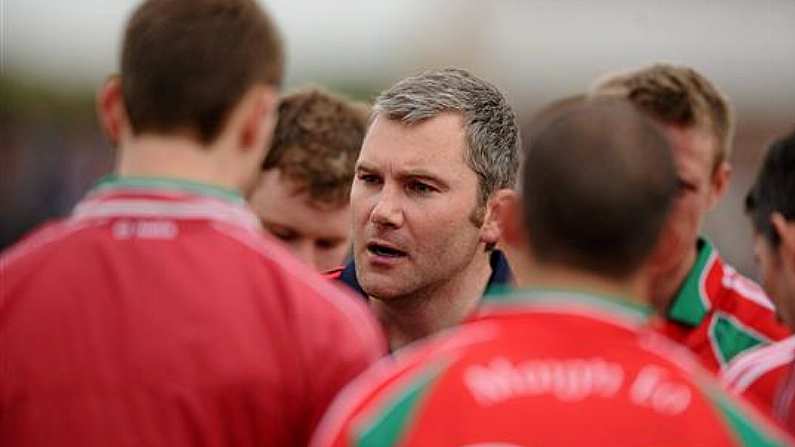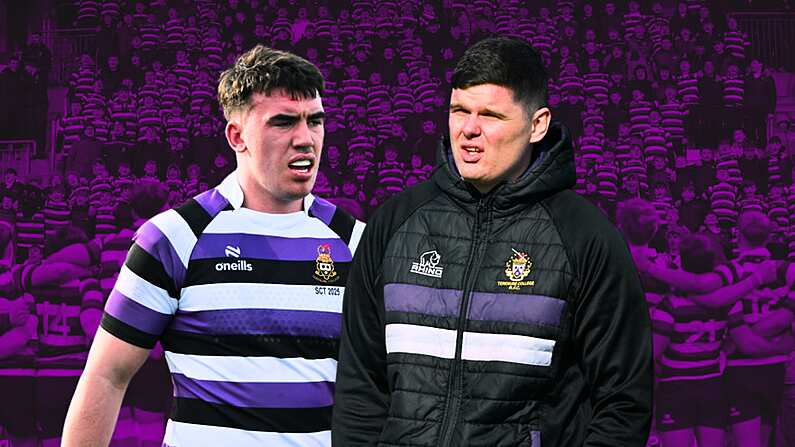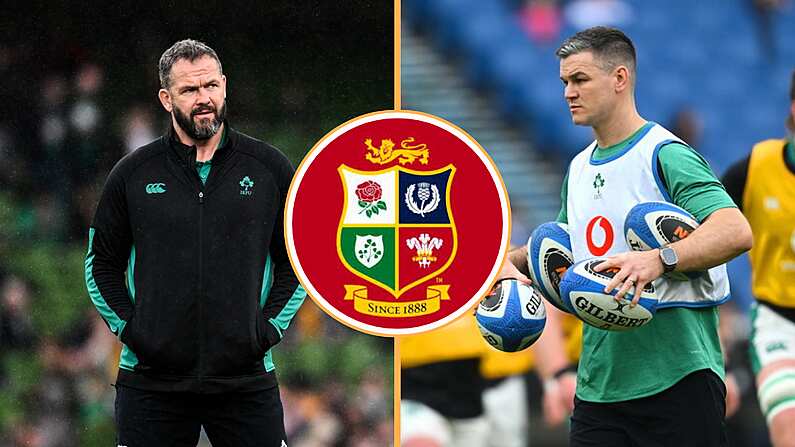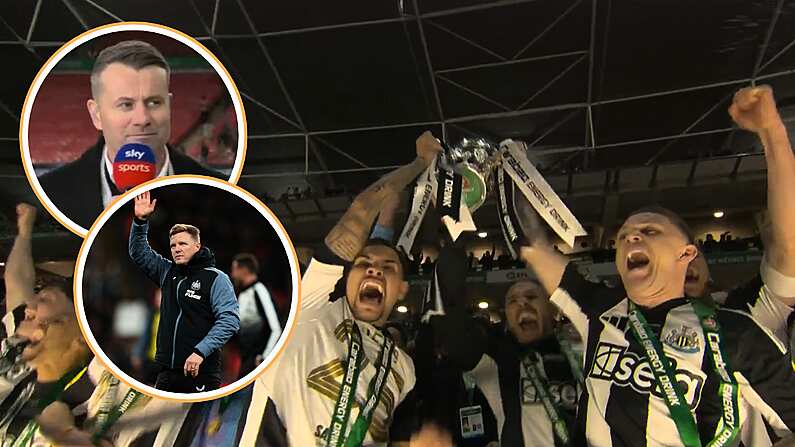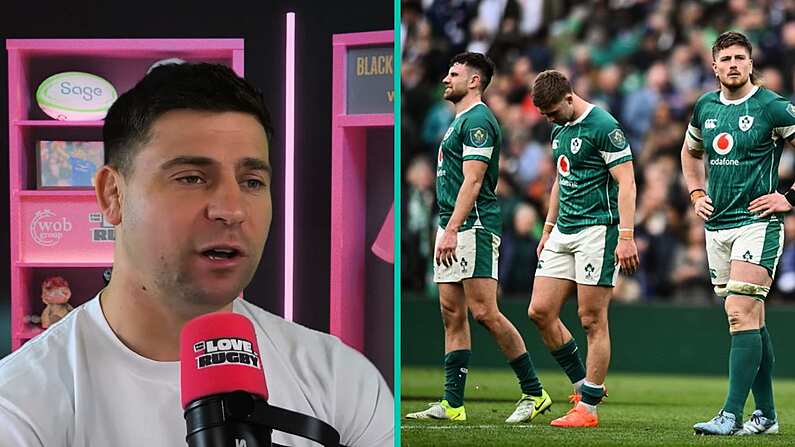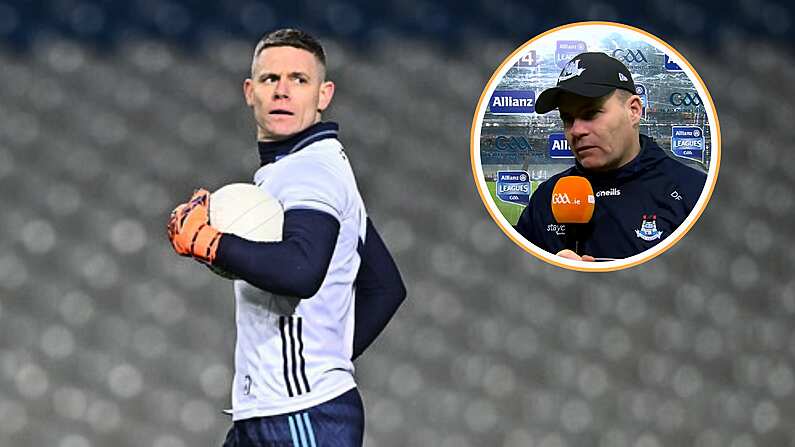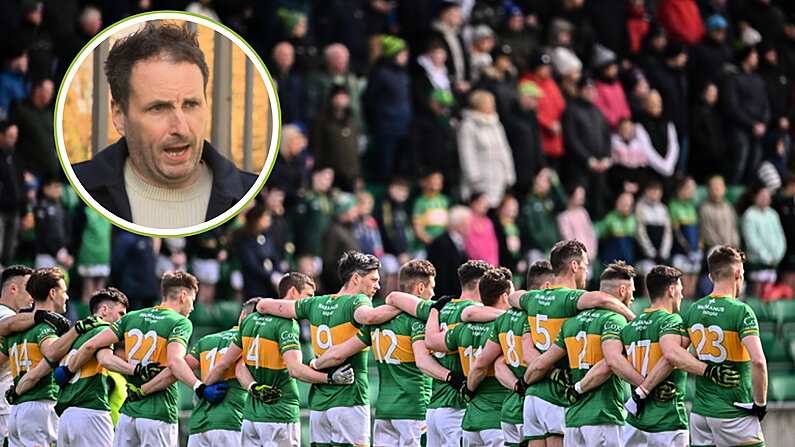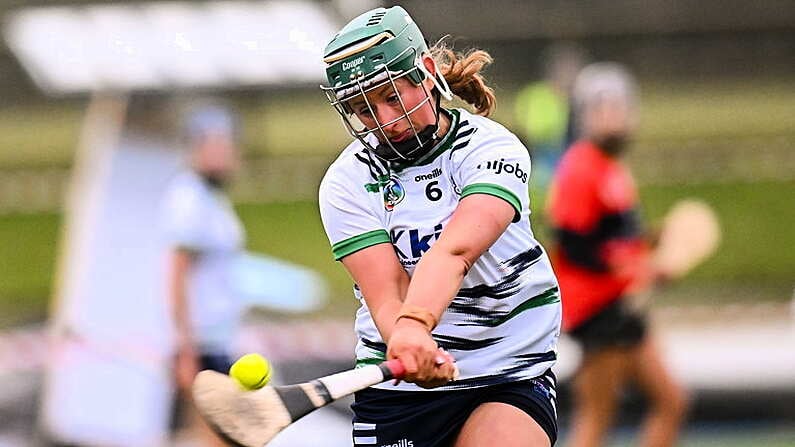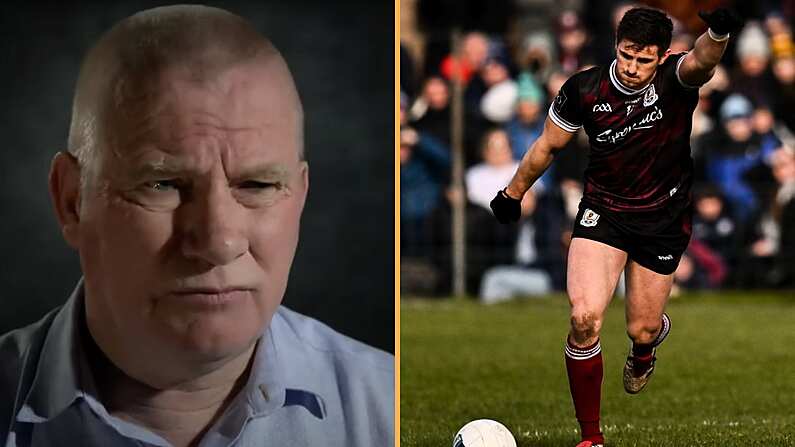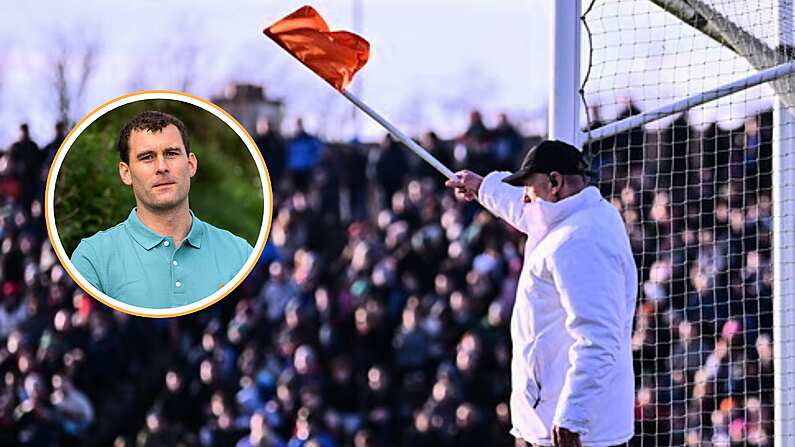"I remember getting a few minutes with James (Horan) and he was grey. He was just grey with shock. He was actually struggling for words. He just kept shaking his head and he couldn't believe what had happened"
Mike Finnerty
Three days before his team suffered the indignity of being the first Connacht side to lose in Ruislip in the championship, Ross Donovan spoke about the ordeal of travelling to London for a championship match.
He spoke in pained terms about the various hardships involved which included getting on a plane and landing at an airport, waking up in a hotel and trying to ingest food when one can.
His tale from the front line attracted little sympathy.
However, Donovan is not alone in suggesting that the Ruislip jaunt can be unnerving in its otherness.
The atmosphere is unlike any other championship match. It has a vague village fete feel with emigrants catching up, knocking back pints in the sun (hopefully) while a game of ball goes on somewhere in the vicinity.
The football is secondary. Or at least is should be, assuming all goes to plan for the visitors.
Two years before Sligo suffered the humiliation of losing to a team based in England, Mayo, under new management, emerged from the encounter pallid and shook after surviving extra-time.
Mike Finnerty, the Sports Editor of the Mayo News, was on commentary duty. It was his third visit to Rusilip, having covered Mayo's trips there in 1996 and 2006.
(In Ruislip) we broadcast from a balcony at the back of one of the goals, it's kinda bizarre, it's like broadcasting from the back of the Davin Stand in Croke Park.
I always remember down underneath us, dozens and dozens and hundreds of people with their backs to the game, who were drinking Magners, enjoying the burgers, and there were ice-creams everywhere. It was a real scorching hot day. There was a queue to the ice-cream van. All of a sudden, these people started turning around and looking at... looking at the scoreboard first of all and then looking at the game. And you could nearly hear the murmer going around among the supporters that "hang on a second, we tuned out of the game. We better tune back in. There's a problem."
John O'Mahony's long yearned for return proved better in anticipation than it was in reality. His curiously abject four-year second spell came to a fitting end in June 2010, with a defeat to Longford in a Round 1 qualifier match in Pearse Park.
[soundcloud url="https://api.soundcloud.com/tracks/265763188" params="auto_play=false&hide_related=false&show_comments=true&show_user=true&show_reposts=false&visual=true" width="100%" height="450" iframe="true" /]
James Horan had won club championships with Ballintubber and was the obvious appointment, though it was greeted with little hoopla at national level.
At the time, the word was he was trying to engender a grittier style of play in Mayo, one more in tune with the way football had gone in the noughties.
Their League form was mediocre but crucially they demolished a dismal Galway team in Castlebar, a result which boded well for the Connacht semi-final. It hadn't even entered anyone's head that they mightn't reach the Connacht semi-final.
In their 41 years in the Connacht championship, London have won three games. Two of those victories arrived in the same year while only one of them occurred in Ruislip.
Their first win came three years into their habitation when Leitrim were humbled 0-9 to 0-6 in Carrick-on-Shannon. Thereafter, it was solid spankings for a decade. Their 33-point defeat to All-Ireland chasing Roscommon in Hyde Park in 1980 convinced the GAA to allow them permanent home advantage for their first round match.
In the past four decades, they've developed a serious knack of frightening the lesser lights in Connacht.
Indeed, Sligo, a humble enough outfit themselves during the 80s and 90s, found it impossible to run up big scores against London, only properly hammering them for the first time in 2008. In 1988 and 1993, their margin of victory was only three points.
Leitrim twice survived extra-time in 1997 and 2003. While the Rossies were made sweat in 2005, winning by a point. By contrast, they usually serve as cannon fodder for the province's big two, regardless of Mayo or Galway's respective health at the time.
Galway were hardly at their most intimidating in 2014 and London were off the back of their grand adventure and still the Londoners took an almighty pasting in Ruislip.
Indeed, Galway remain the one team in Connacht whom London haven't got within a sniff of upsetting. Their narrowest margin of defeat was ten points in 1999, ironically coming in a year when Galway were defending All-Ireland champions.
In 1996, before they would embark on a glorious, heartbreaking odyssey, John Maughan's Mayo limped unconvincingly past London in late May. There was little inkling that they would stand on the cusp of an All-Ireland four months later.
Aside from that, Mayo have typically navigated the Ruislip test with minimal drama. Until 2011, that is.
Finnerty's memories of the day are extremely vivid. It was apparent early on that Mayo were off-key and suffering from the yips.
Things were at a pretty low ebb when James took over. But going over to London, there was a sense that it was a new start. It was a really warm day and it was apparent early on that Mayo had a serious case of the yips. They just weren't playing particularly well. They were going through free-takers like they were going out of fashion. I think seven free-takers in total had a go. It wasn't happening for any of them. And that day, James Horan had decided to employ a sweeper system and it wasn't really working.
As usual in Ruislip, the crowd was largely packed out in away jerseys. For all Mayo's early struggles, the crowd needed more compelling evidence to by-pass the ice-cream van and pay attention to the game.
There's a huge Mayo diaspora in London. It's a great excuse for people to meet up. There's never any doubt over the outcome. It's a rare day as a Mayo supporter where you can go to a game safe in the knowledge that it was going to work out. Or so we thought.
London shot into an early lead but the assumption was that Mayo would shake themselves and trample the minnows underfoot soon enough.
It was the second half when people started to panic.
It began to dawn on people slowly and surely that Mayo weren't getting it together. They weren't starting to pull away. They weren't getting on top.
This wasn't 1996 when Mayo played crap but were plainly always going to claim an unsatisfactory victory and limp into the next round.
It genuinely looked like Mayo were going to lose here.
With minutes remaining, points from Paul Geraghty and Killian Phair had put London 1-9 to 0-10 ahead.
The last fifteen minutes were nervewracking. It was dawning on you with every minute, 'hang on, Mayo could lose this'. On the sideline, James Horan threw in some subs. And all of a sudden, the game was heading to injury-time and Mayo were two points behind.
I'll always remember the two scores that saved Mayo that day. The first one, Trevor Mortimer got the ball and he couldn't have been far inside halfway. He just looked around and there was nothing happening. And he just put the head down and let fly and it flew over. It was an incredible point. Pretty much from the kickout, Mayo worked the ball down along the left wing and Kevin McLoughlin - and I think James Horan would be the first to admit that he was the man who saved his career - cut in with the equaliser, sent the game to extra-time.
Extra-time was far from a conga dance. The extra thirty minutes can sometimes be akin to a replay with the underdogs deflated by their failure to seize victory in normal time and the favourites re-gathering themselves and running riot.
While that didn't quite happen in Ruislip in 2011, Mayo had wrested back some control. They eventually ground out a three-point win - 0-19 to 2-10.
And again, to be honest, extra-time, it's not like Mayo clicked into gear and blew London away. Extra-time was very nervy, very tense and I remember the longer the game went on, I was getting text messages galore from home because the social network system wasn't as advanced as it is now so we were people's eyes and ears to the game.
And people were in disbelief at home. They couldn't believe what they were hearing. And they wanted to know was it as bad as it was sounding. And in extra-time, Mayo just did enough. I remember Andy Moran came in that day and played a hero's part, as he's done so many times for Mayo. And when it was all over, there was a massive sigh of relief. And as far as the fans go, everybody got back to the party. But there was a surreal atmosphere around the ground. You could hear the murmers.
Owing to the extra-time, for which the county board logistics people hadn't really provided, the Mayo team's flight departed the scene remarkably soon after the final whistle.
James Horan aged a fair bit in that seventy minutes. He didn't get much time to enjoy the post-match marquee. He wasn't really in the mood to savour a few country classics in any event.
While the band cranked out a few numbers, Horan sat with his back to them, presumably trying to comprehend what had happened.
I remember getting a few minutes with James (Horan) and he was grey. He was just grey with shock. He was actually struggling for words. He just kept shaking his head and he couldn't believe what had happened.
And we were sitting in a Marquee where there had been a band pre-booked for the party, for the celebration. And they were banging out the hits in the background. All these country classics and crowd favourites. And James was just sitting there with his back to them, shaking his head. I remember he had his head in hands at one stage, just kinda saying 'what in the name of God happened out there?'
Mayo recovered to win Connacht that year, not their most swaggering provincial victory but it put Ruislip (and Pearse Park) to the back of everyone's minds. Galway were in rag order that year and put up a miserable show in Castlebar. Roscommon, typically still a bit giddy from the previous year's unexpected win, were pipped in a drab Connacht Final.
Joe Brolly very publicly gave Mayo zero chance of unseating the All-Ireland champions in the quarter-final. Their victory against Cork represented the first real inkling that boom times were coming.
Mayo were coming off a very poor previous summer. Mayo's confidence was shot after what happened in 2010. They'd been beaten by Sligo and Longford the previous summer. There was a lot of baggage from that defeat.
And I think James Horan saw for himself that day that there was a lot of work to be done with that group, mentally as much as anything. They really had lost confidence in themselves. As soon as London put it up to them that day and got in their faces and got ahead of them, Mayo didn't seem to have the self-belief or the leadership on the field to respond. They were really lacking in that mental strength and that self-esteem.
That was something that James Horan really tackled over the next few months. It's hard to credit where Mayo have gone from there because I think in a lot of ways that close shave with London in 2011 was the making of this Mayo team you see today.

